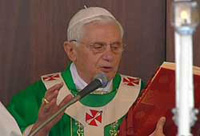Pope urges Czechs to rediscover Christian traditions
 Prague - Pope Benedict XVI urged Czechs to rediscover their Christian roots at the start of his three-day pastoral visit, touring the highly secular ex-communist country in a year marking two decades since Communism fell in Europe.
Prague - Pope Benedict XVI urged Czechs to rediscover their Christian roots at the start of his three-day pastoral visit, touring the highly secular ex-communist country in a year marking two decades since Communism fell in Europe.
"Now that religious freedom has been restored, I call upon all citizens of this republic to rediscover the Christian traditions which have shaped their culture," Benedict said on arrival in Prague.
He urged believers to make themselves heard. "I invite the Christian community to continue to make its voice heard as the nation addresses the challenges of the new millennium," he said.
Speaking later at Prague's famed St Vitus Cathedral, the pontiff called for "renewed effort throughout the Church so as to strengthen spiritual and moral values in present-day society."
The pope, who repeatedly called on Europe to return to its Christian roots, appealed on the country's Roman Catholic Church to educate new generations "with particular zeal."
The 82-year-old pontiff acknowledged a difficult task in the country of 10.5 million where distrust of organized religion is deeply ingrained, and church-and-state relations remain strained.
"The cost of 40 years of political repression is not to be underestimated," he said. "A particular tragedy for this land was the ruthless attempt by the government of that time to silence the voice of the Church."
Before visiting the cathedral - subject of a nearly 17-year legal battle between the Roman Catholic Church and the state - the pope warned against detaching religion from houses of worship. Many Czechs view churches as cultural and historic landmarks.
"How tragic it would be if someone were to behold such examples of beauty, yet ignore the transcendent mystery to which they point," he told a gathering of Czech public figures - among them former president Vaclav Havel - at Prague Castle.
The pope is visiting one of the most secular nations in Europe. According to the latest census, conducted in 2001, less than one third of Czechs said they belong to a church.
Eda, 55, an unemployed Prague resident who declined to give his last name, reflected what many feel about the papal visit. "It's a waste of money," he said. "It could have been used in a more sensible way now during the economic crisis."
Lada Havlickova, 34, a mother of two on parental leave, was only a little more positive: "It's nice that he came - but not on my account. I'm an atheist."
Czechs began losing faith in the 19th Century when leaders of their national movement were criticizing the Catholic Church as a religion that had helped the Habsburg dynasty to subjugate the Czech lands more than 200 years earlier.
In the first stop of his trip, Benedict XVI paid a tribute to the Infant Jesus of Prague, a wax statuette revered by Roman Catholics worldwide.
Many Czechs have no knowledge of the effigy. It was brought to Prague in 1628, the period of a Catholic, pro-Habsburg drive portrayed by the 19th-Century Czech patriots as the darkest time in the nation's history.
Benedict presented the statuette with a golden crown as families crowded the Baroque-style Church of Our Lady Victorious where it is located.
The pope was seen off at Rome's Ciampino Airport by Italian Prime Minister Silvio Berlusconi, at a time when the relations between the Italian government and the Vatican have been tense. It was their first meeting since Berlusconi was first ensnared in a sex scandal several months ago.
He was greeted at Prague International Airport by a guard of honour and welcomed by President Vaclav Klaus and Prague Archbishop Cardinal Miloslav Vlk.
He received a warm if modest welcome from hundreds of believers, including tourists, in the streets of Prague. "Long live the Holy Father," a group of Slovaks chanted in front of the church where the Infant Jesus figurine is placed.
In a highlight of the tour, Benedict XVI is to celebrate Sunday mass in Brno, the Czech Republic's second largest city.
Around 9,000 Slovaks and 1,000 Poles and several hundred Germans and Austrians are expected to be among the estimated 100,000 participants, the organizers said.
On Monday, the pontiff is set to honour the Central European nation's patron saint, St Wenceslas, in Stara Boleslav outside Prague. He is expected to address an estimated 50,000 people at the site.
The papal visit has brought renewed attention to the long-standing sore points between the Czech Republic and the Vatican, including Prague's failure to ratify a treaty with the Holy See and agree on compensation for the Church property seized by the Communists.
Prime Minister Jan Fischer said after meeting Cardinal Tarcisio Bertone, the Vatican's Secretary of State, that the Catholic Church would delay efforts to seek a property settlement until after the global economic crisis. dpa